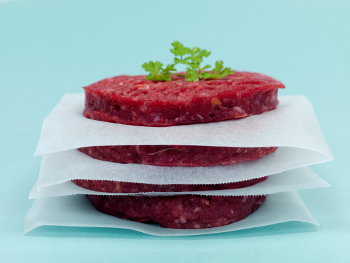Frozen burger sales fall 42%: Horsemeat update

-Kantar Worldpanel data shows the horsemeat controversy is affecting what shoppers buy -FSAI has now revealed its latest DNA results -Birds Eye traces horse DNA to Irish supplier
4 March 2013
The latest supermarket share figures from Kantar Worldpanel in Ireland, published today for the 12 weeks ending 17 February, reveal the initial impact of January’s horsemeat scandal on consumer shopping habits.
David Berry, commercial director at Kantar Worldpanel, explains: "The impact of the horsemeat issue has so far only affected what consumers put in their baskets rather than where they do their shopping. For the four weeks ending 17 February frozen burger sales were down by 42% as shoppers chose to buy alternative meals.
"Aldi continues to set the pace with sales growth of 29%, increasing its share of the market from 4.6% last year to 5.9%. What is notable from Aldi’s performance is that it has grown sales of fruit and vegetables – the most valuable grocery category – by 39% this year
"Among the big three supermarkets Dunnes is the only grocer to increase its share of the market. Benefitting from bigger shopping baskets, the retailer beat the market with 4.1% sales growth. Tesco’s performance has improved slightly since January but still remains behind the market, leading to a drop in market share for the second successive period."
The 0.8% growth seen in the market is the highest level since December 2011 and is attributable to the continued increase in the price of groceries.
FSAI industry test results
In a futher update to the ongoing horsemeat controversy, the Food Safety Authority of Ireland (FSAI) has now also released the results of 957 industry tests on beef products, beef ingredients and other ingredients for the presence of horsemeat. These can be viewed here on the authority’s website.
Birds Eye traces horse DNA to Irish supplier
An investigation by Birds Eye has shown that Frigilunch N.V. (who supplied two products containing horse DNA to the company) was itself supplied meat with horse in it by an Irish meat processor QK Meats.
A press release issued by the company said: "Frigilunch N.V.’s own independent tests and investigation have confirmed our findings. We have reported these findings to the FSAI and Frigilunch N.V. has taken immediate action and suspended them as a supplier of meat. All other meat suppliers to Frigilunch N.V. have been given the all clear through both Birds Eye’s and Frigilunch N.V.’s separate testing programmes. You can rest assured that all other suppliers to Birds Eye have also been given the all clear."
The products that Birds Eye removed from sale as a precaution on 22 February were its Spaghetti Bolognese 340g and the Beef Lasagne 400g.
Birds Eye has now introduced "a new on-going triple lock DNA testing programme" which it says "will ensure no minced beef meat product can reach supermarket shelves without first having been cleared by three stages of DNA testing.
"We are now demanding, and have agreed with all suppliers, that they DNA test all products entering their premises. They will then DNA test products leaving their premises. Birds Eye will then conduct its own DNA tests before products go to shops. We believe this triple lock DNA testing process is the leading way to do this in our industry."
According to media reports, cold storage firm QK Cold Stores which is based in Naas, Co Kildare, had already confirmed tests on consignments of imported beef product returned positive for horse DNA. The company said it had isolated the contaminated meat and informed the Department of Agriculture.
"QK Cold Stores can confirm that as part of its own quality controls, the company conducted DNA testing on consignments of imported beef product which revealed the presence of equine DNA," the company said in a statement. "Upon discovery, these consignments were immediately isolated and either returned to the suppliers concerned or detained at QK Cold Stores facility."



 Print
Print






Fans 0
Followers